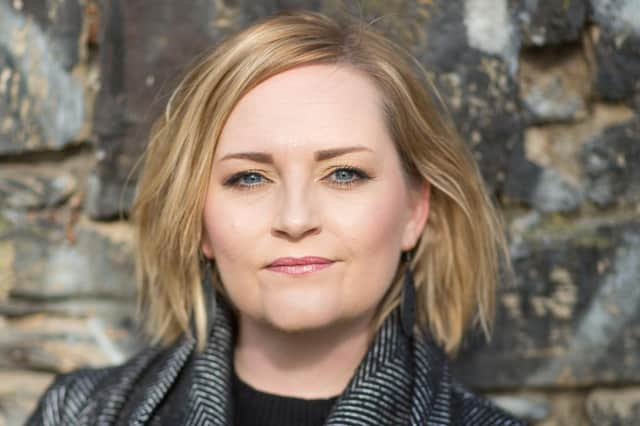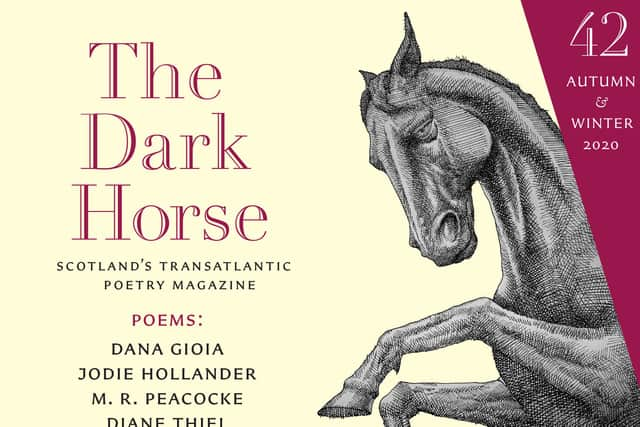Police warned leading Scottish poet over threats to safety after social media 'hounding'


Jenny Lindsay, one of the country’s best-known spoken word performers, has revealed she was advised not to attend events unaccompanied after she was targeted online.
Lindsay has told she she felt she was the victim of "a casting out" and "a shaming" after being singled out for speaking out on social media over the nature of posts by a transgender activist, and their subsequent defence in an online magazine article, suggesting they had advocated violence against women taking part in a demonstration in London.
Advertisement
Hide AdAdvertisement
Hide AdIn a new essay in poetry magazine The Dark Horse, Lindsay sets out how she was told was being “denigrated" on private online forums for writers.


In the essay, entitled “Anatomy of a Hounding,” she also tells how she began to lose work and found out from fellow poets that they had come under pressure not to share a stage with her.
In the new essay, Lindsay, a leading figure in Edinburgh’s poetry scene for nearly 20 years, describes her treatment as "social ostracization coupled with cultural authoritarianism."
The police involvement came after the intervention of the Scottish Poetry Library in February of this year when it issued a statement condemning “bullying and calls for no-platforming of writers in events programmes and publishing.”
Advertisement
Hide AdAdvertisement
Hide AdIt stated: "There has been an escalation, particularly on social media, of disharmony, which is creating fractures that aren’t sustainable or healthy in a small country like Scotland."
In her essay, Lindsay - who has tackled sexual politics, gender and feminism in her recent stage show and book This Script - recalls how she was continually “unfollowed and unfriended” on social media by Scottish writers and poets, despite making little public comment.
She added: “I began to feel I was experiencing an almost Kafkaesque surveillance and denigration, without knowing what the exact charges were so having no means to challenge them.
"My income as a freelancer – always precarious – dropped substantially on previous years’ despite releasing my best work to date.
Advertisement
Hide AdAdvertisement
Hide Ad"As anyone who has been through this will know, the only way one can survive a smearing of this kind is with robust defence from those who know and love you. It was in short supply, partly because so many of my friends/peer group are in the literary sector.
"I was told about private forums for writers on Facebook where I was being denigrated, often without being named. Scotland’s literary sector is small. The target was evident. Knowing that people I thought of as friends were bearing witness to such things but saying nothing in my defence was gut-wrenching.”
In her essay, Lindsay recalls how her relief at the initial reaction to the SPL’s statement was “short-lived” after the publication of an open letter accusing the body of “institutional transphobia.”
It suggested that “the language used and the manner of communication led us to worry that the statement provided cover and comfort to public transphobia, and failed to protect and respect trans writers.”
Advertisement
Hide AdAdvertisement
Hide AdOn International Women’s Day in March, Lindsay was named in the Scottish Parliament by Joan McAlpine, chair of Holyrood’s culture committee, as an example of a feminist poet who had been subjected to “online mobs trying to prevent their getting work or blocking their performances.”
Writing in her essay, Lindsay states: “Social media has taken a wrecking ball to both individual and institutional self-confidence, with cultural edicts making our scene at even the formerly very open-access grassroots level appear exclusive.
"What happened to me could easily happen to any of you if we allow lies to become truth and women to be police by standards we would never demand of men.
"We cannot permit our literary culture to become a reflection of, rather than a powerful antidote to, an increasingly corrupted political discourse on this and so many issues.
Advertisement
Hide AdAdvertisement
Hide Ad"We cannot have a healthy literary culture if we allow this to continue and without our institutions supporting values of free, democratic, creative expression. Robustly. Publicly. The alternative is cultural vandalism.”
Asif Khan, director of the Scottish Poetry Library, said: “A key consideration for the arts sector as a whole is the fostering of positive relationships. In this day and age, there is little space for nuance and empathy on social media platforms.
"A key consideration for the arts sector as a whole is the fostering of positive relationships. In this day and age, there is little space for nuance and more often empathy on social media platforms.
"National Poetry Day on Thursday demonstrated the strides we can make on promoting the art form and the undoubted talent in Scotland when we come together.”
A message from the Editor:
Advertisement
Hide AdAdvertisement
Hide AdThank you for reading this story on our website. While I have your attention, I also have an important request to make of you.
The dramatic events of 2020 are having a major impact on many of our advertisers - and consequently the revenue we receive. We are now more reliant than ever on you taking out a digital subscription to support our journalism.
Subscribe to scotsman.com and enjoy unlimited access to Scottish news and information online and on our app. Visit www.scotsman.com/subscriptions now to sign up.
By supporting us, we are able to support you in providing trusted, fact-checked content for this website.
Joy Yates
Editorial Director
Comment Guidelines
National World encourages reader discussion on our stories. User feedback, insights and back-and-forth exchanges add a rich layer of context to reporting. Please review our Community Guidelines before commenting.